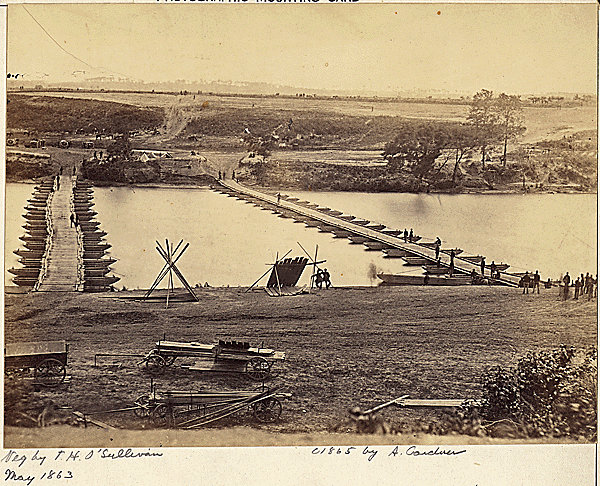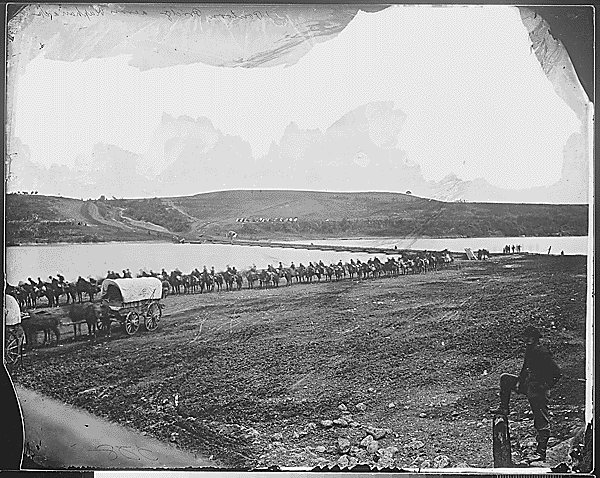To return. Now commenced a series of the hardest marches on record. We took up line of march from Gordonsville and marched in the direction of Orange courthouse. We travelled the entire day until night usurped the rule of day, the men groaning under their knapsacks, and toiling along with feeble steps. At night we were asleep as soon as touched the ground. I, fortunately, left my knapsack behind with Jesse, and had only my blanket to carry. This I twisted and strung over my shoulders like a Scottish plaid. Being the easiest way of carrying it. We lived along our marches on a small ration of bacon and hard crackers, so hard it took rocks to break them, and occasionally we got some roasting ear and green apples, but such things were scarce. We marched on an average of twenty miles a day, but often we had to go nearer thirty. I found myself as able, although young, to stand the march as well as anyone in my company. That night we sometimes halted, and again sometime marched on till near morning when halted we tumbled down on the spot we were halted at, and after building a little fire and eating a scanty supper, roll up in our blankets and sleep as soundly as if all was peace. Rain may come and drench you, yet, sleep still hold her own. This then was our daily routine. As soon as day dawns again, we are on the march. Some point must be gained at every hazard, and every nerve is strained to do so. Pope1 and his retreating Army retreat steadily before us, occasionally he gives our advance guard a skirmish. At length we crossed the Rapidan River, the enemy still retreating before us. On crossing the Rapidan we were formed in line of battle and advanced through several old fields in battle line, but no enemy appearing in view we again took to the file. Now, the Rapidan having been crossed, though the race was for the Rappahannock, we kept steadily on day after day, past the well fought and victorious battlefields of Cedar Run2, until we arrived in the neighborhood of the Rappahannock, and here the enemy seems determined to make a stand and dispute the passage of the river. We had now been about twenty days on the march continually. The enemy now drew up his artillery on this side of the river, and threw his pontoon bridges across to facilitate his retreat, though next morning after we arrived in the neighborhood of the Rappahannock River, by day dawned, General Evans formed his brigade in battle order and advanced on the enemy’s batteries. We marched over several wheat fields, and being supported by a detachment of the celebrated Washington Artillery from New Orleans3, we pressed forward into range of the enemy’s cannon. The Washington Artillery got up to the top of the hill and opened the ball, then commenced one of the fiercest artillery duels ever fought. We were about 100 yards behind the Washington Artillery and in full range of the enemy’s guns. The shells fell around us as thick as hail, the air above our heads was fairly rent with the shrieks of the cannon balls and shells bursting, ricocheting, and whizzing amongst us. The roar of seventy-five pieces at once was truly dreadful, strange to say, we had lost few men so far, but we were lying exposed to every shot, and General Evans, seeing this, rode up to us and swore he would take the Yankee battery. He ordered the Halcombe Legion to charge it, and we to follow next. We had an open old field to cross, and the enemy seeing this, directed their fire at us and hurled rains of grape, canister, shrapnel and shells at us. Men were falling thick, but we charged up the hill, shouting like demons, but lo; the enemy had fled, crossed the river, taken up his bridges, and established his battery on a hill on the other side of the river, and now being out of our reach, poured their fire into us. We were ordered to lie down on the side of the hill, and there we lay for eight hours beneath a scorching sun, partially shielded by the hill from the enemy’s fire, which flew over us like rain about three feet above our heads, and occasionally dropped among us. The enemy at last found out our whereabouts, and moving their batteries, raked the side of the hill we were lying on, killing and wounding several at the first discharge. We shifted around to the other side of the hill and laid there awhile, when General Evans came up and ordered us to retreat to a piece of woods a short distance back. We were again compelled to cross this old field, and in view of the full fire of the Yankees, but we reached the woods with slight loss. Here we remained until night, and the enemy ceased firing and resumed their retreat. We advanced to the hill we had driven the Yankee battery from and found several dead Yankees and a quantity of commissary. After this sever shelling, and having buried our dead, and cared for our wounded, resumed the pursuit of the Yankees. Our Regiment was particularly fortunate in this instance, while the Halcombe lost about sixty in killed and wounded, we had only about six. We marched the next day after the shelling higher up the Rappahannock to the bridge over it, but found this bridge defended by the enemy. We stopped here one day while our pickets kept up a continual scattering fire with the Yankees across the river. The Yankees burned the bridge and seemed determined to prevent our crossing it, but here General Stonewall Jackson4 performed one of those quick evolutions for which he was so famous. About dark one night, leaving the artillery on our side to keep up a fire on the enemy at the bridge, we drew off and marching behind the hills and woods, eluded the sight of the Yankees and making a foxed march to a ford about twelve miles down the river, we crossed over, the enemy still thinking we confronted them at the bridge. The next morning our artillery withdrew, and the enemy discovered the ruse played upon them, and again commenced a retreat. Our pursuit was hotter than ever. Often we came across a dead Yankee laying in the road, and broken guns, knapsacks and overcoats became more numerous than ever. It was evident that Pope could not go further without turning to give us battle, and it proved to a battle worthy of our expectations, and as severe as contending mortals can make it.
1 John Pope - https://en.wikipedia.org/wiki/John_Pope_(military_officer)
2 Battle of Cedar Run - http://www.sonofthesouth.net/leefoundation/jackson/battle-cedar-run.html
3 141st Field Artillery Regiment - https://en.wikipedia.org/wiki/141st_Field_Artillery_Regiment
4 Thomas Jonathan “Stonewall” Jackson - https://en.wikipedia.org/wiki/Stonewall_Jackson


